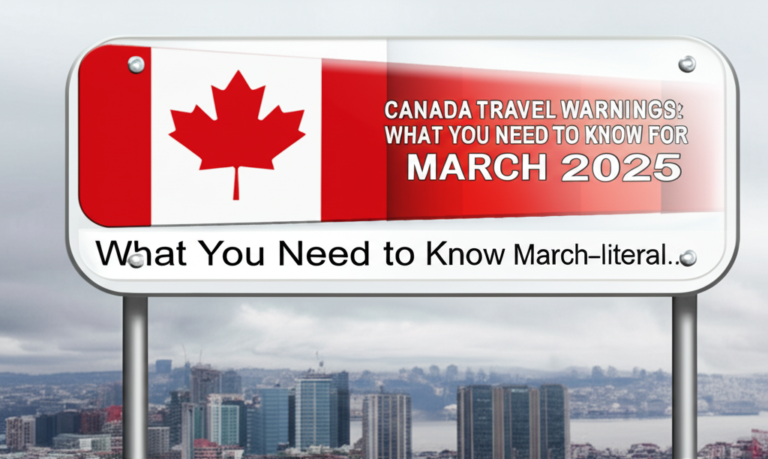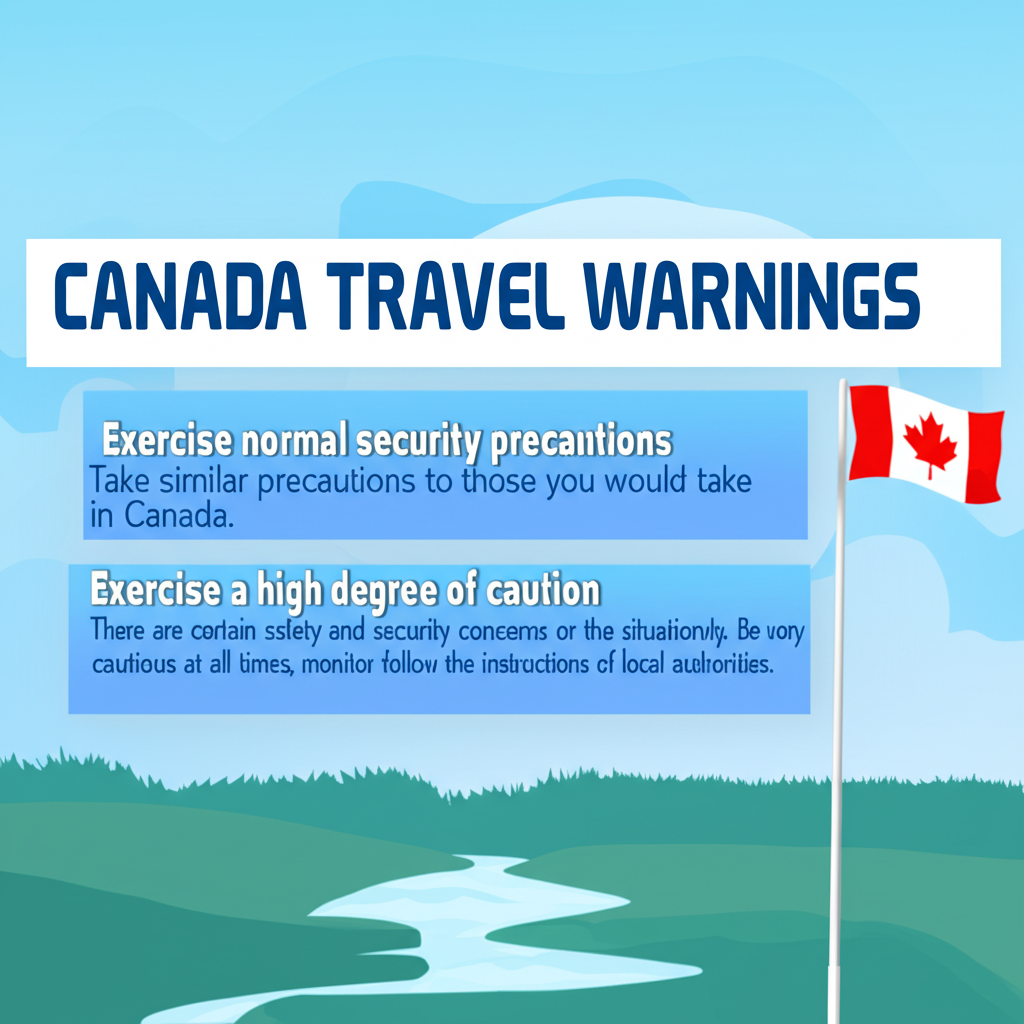
Canada Travel Warnings: What You Need to Know for March 2025
Introduction
Planning a trip should be an exciting adventure, not a stressful guessing game. Before you pack your bags and set off to explore Canada in March 2025, it’s crucial to get the lay of the land—literally! Travel warnings and advisories are your secret weapon for making smart, safe, and informed decisions about your destination.
Think of travel warnings, also known as travel advisories, as the government’s way of giving you a heads-up about potential bumps in the road. These official notices are designed to keep citizens informed about the relative safety of traveling to specific destinations. They cover everything from security risks and health concerns to natural disasters and potential disruptions.
Understanding Travel Advisories
The Canadian government, through its Travel.gc.ca website, provides up-to-date information so travelers can make informed decisions and travel safely abroad. Countries like the UK, Germany, and Denmark also offer travel advice to their citizens.
Travel advisories are categorized into four risk levels:
- Exercise normal security precautions: Take similar precautions to those you would take in Canada.
- Exercise a high degree of caution: There are certain safety and security concerns or the situation could change quickly. Be very cautious at all times, monitor local media, and follow the instructions of local authorities.
- Avoid non-essential travel: Your safety and security could be at risk. Consider whether you really need to travel to this country, territory, or region based on family or business requirements, familiarity with the region, and other factors.
- Avoid all travel: You should not travel to this country, territory, or region. Your personal safety and security are at great risk. If you’re already there, consider leaving if it’s safe to do so.
Canada’s Safety Ranking in 2025
Canada continues to be recognized as one of the safest countries in the world. According to recent rankings, Canada consistently scores high in safety from violent crime, terrorism, and transportation safety. This reputation is further enhanced by its commitment to traveler safety provisions for women, LGBTQIA+ individuals, and people of color.
While Canada may have slightly shifted from the top spot it held previously, its longstanding record of high safety ratings makes it an attractive destination for tourists and those considering permanent residency.

Regional Safety Concerns
Despite the overall positive safety ranking, certain urban centers in Canada are experiencing rising crime rates. A 2025 crime report highlighted a surge in crime indices across several cities, impacting both residents and tourists:
- Surrey and Kelowna: Significant concerns regarding property crimes such as theft and vandalism, with Surrey also facing gang-related activities.
- Winnipeg and Regina: Continue to grapple with violent offenses, often linked to socioeconomic disparities.
- Sudbury and Sault Ste. Marie: Struggle with drug-related offenses, prompting increased collaboration between law enforcement and local organizations.
Health Advisories for March 2025
Health-related advisories remain a constant consideration for international travel to Canada. Key health precautions include:
- Vaccinations: Ensure routine vaccinations are up-to-date, including measles, mumps, rubella, diphtheria, tetanus, pertussis, polio, and varicella.
- Food and Water Safety: Practice safe food and water precautions to avoid traveler’s diarrhea and other waterborne illnesses.
- Insect Protection: Use insect repellent and wear protective clothing to prevent mosquito bites and tick bites, reducing the risk of diseases like Zika virus and Lyme disease.
Geopolitical Considerations
One significant trend in the March 2025 advisories is the increased scrutiny of travel between Canada and both the United States and China.
United States Travel Considerations
In the U.S., stricter immigration enforcement has led to detentions and deportations of foreign travelers, prompting Canada to advise its citizens to register with U.S. Citizenship and Immigration Services (USCIS) if staying longer than 30 days. Failure to comply could result in penalties, fines, or even prosecution.
China Travel Considerations
Travel to China carries its own set of risks. The advisory warns Canadians, especially those with dual citizenship, to exercise a “high degree of caution.” The lack of transparency in China’s judicial system limits the Canadian government’s ability to provide consular assistance. Non-violent acts, such as financial crimes, may incur severe punishment, and travelers may face exit bans if linked to ongoing investigations.
Recommendations for Safe Travel
Stay Informed
- Regularly Check Travel Advisories: Before and during your trip, monitor the Government of Canada’s Travel.gc.ca website for the latest travel advisories and health notices.
- Subscribe to Updates: Sign up for email notifications or download the Travel Smart app to receive real-time alerts about potential risks in your destination.
Plan Ahead
- Research Your Destination: Familiarize yourself with local laws, customs, and potential safety concerns in the specific regions you plan to visit.
- Register with the Registration of Canadians Abroad: This free service allows the Canadian government to contact you in case of an emergency abroad.
- Share Your Itinerary: Leave a detailed itinerary with family or friends, including flight information, accommodation details, and planned activities.
Protect Your Health
- Consult a Healthcare Provider: Schedule a pre-travel consultation with your doctor or a travel health clinic at least 6-8 weeks before your departure.
- Pack a Travel Health Kit: Include essentials such as insect repellent, sunscreen, hand sanitizer, a first-aid kit, and any prescription medications you require.
- Be Aware of Local Health Risks: Research potential health hazards in your destination and take appropriate precautions.
Secure Your Belongings
- Be Vigilant Against Theft: Take precautions to protect your belongings from theft, especially in crowded areas and tourist hotspots.
- Make Copies of Important Documents: Keep copies of your passport, visa, driver’s license, and other essential documents in a separate location from the originals.
Travel Insurance
- Purchase Comprehensive Travel Insurance: Ensure your travel insurance policy covers medical expenses, trip cancellation, interruption, and loss or theft of belongings.
- Understand Your Coverage: Carefully review the terms and conditions of your travel insurance policy, paying attention to any exclusions or limitations related to travel advisories or pre-existing conditions.
Methodology Behind the Warnings
The travel warnings and advisories are based on a systematic approach to identify, evaluate, and report potential risks. This involves:
- Data Collection: Gathering relevant information from diverse sources, including government publications, travel industry reports, open-source data, Statistics Canada, and expert consultations.
- Data Evaluation: Assessing the credibility and relevance of the collected data.
- Risk Assessment: Analyzing potential hazards and their possible impacts on travelers using statistical analysis, risk scoring, scenario planning, and qualitative analysis.
- Reporting: Compiling findings into actionable travel warnings.
Limitations of Travel Advisories
While the Canadian government strives to provide accurate and timely information, travel advisories are not without limitations. The global landscape is constantly changing, and unforeseen events can occur at any time. Additionally, the information provided is based on available data and may not always reflect the complete picture on the ground.
Conclusion
Navigating the world of travel advisories can feel like deciphering a complex code, but armed with the information in this article, you’re now well-equipped to make informed decisions about your March 2025 travels to Canada.
Remember, travel advisories are a snapshot in time. The global landscape is constantly shifting, and what’s considered safe today might change tomorrow. That’s why it’s crucial to stay updated as your trip approaches. Bookmark the Travel.gc.ca website and check it regularly for the latest information.
The key takeaway? Knowledge is your best defense. By understanding the potential risks and taking appropriate precautions, you can minimize your exposure and maximize your enjoyment. Whether it’s exercising caution in urban centers with rising crime rates, staying informed about health advisories, or being aware of geopolitical tensions, a little preparation goes a long way.
Your journey should be filled with excitement and discovery, not unnecessary worry. Travel smart, travel safe, and make memories that will last a lifetime. What steps will you take today to ensure a safer trip tomorrow?
Canada Travel Warnings: What You Need to Know for March 2025
